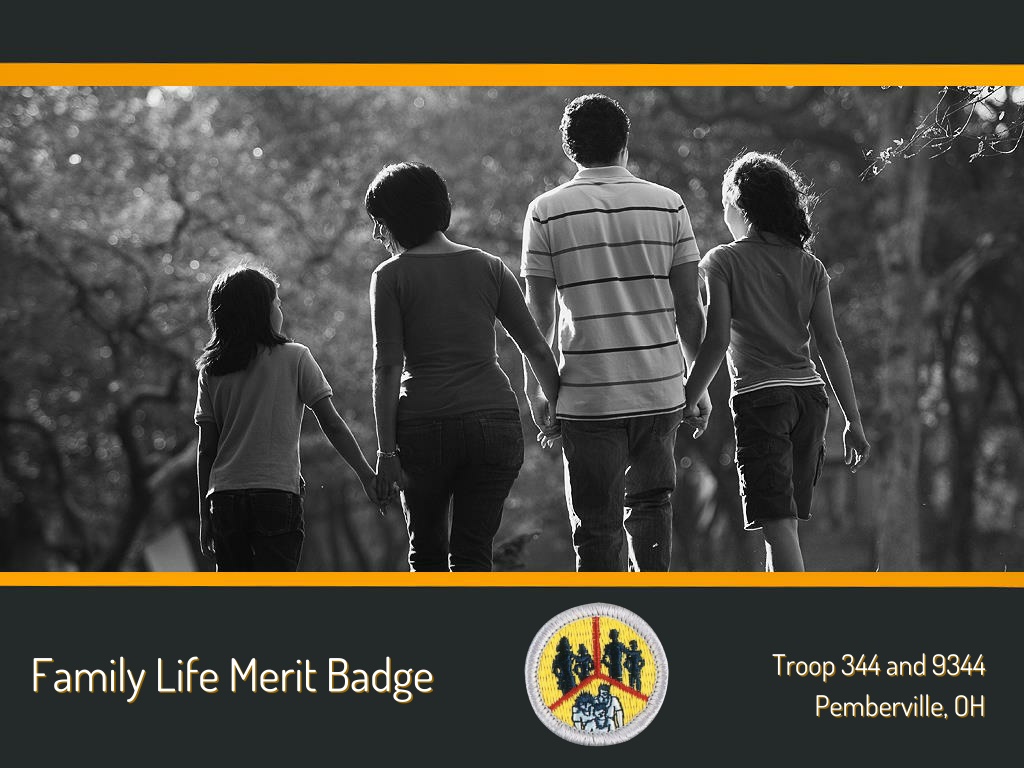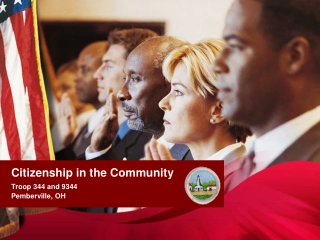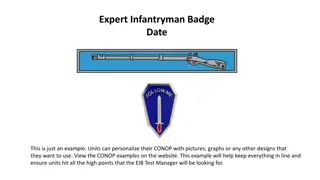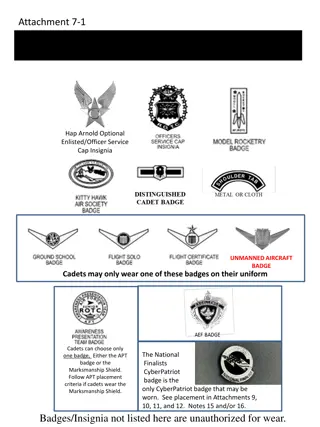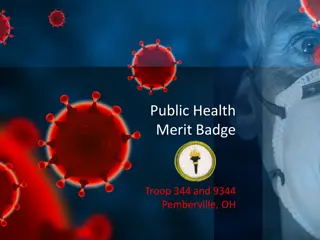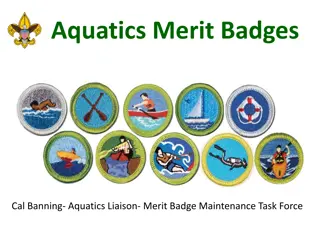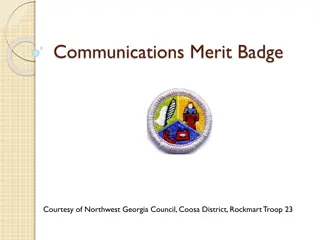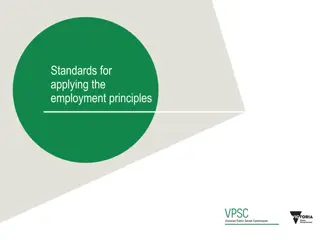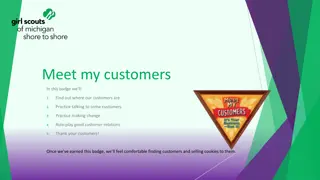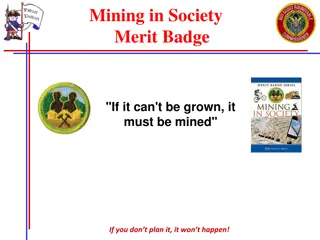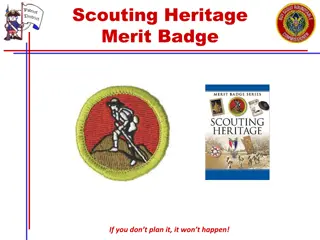Family Life Merit Badge Requirements and Guidelines
The Family Life Merit Badge encourages Scouts to explore the importance of family dynamics, responsibilities, and communication. Requirements include understanding family roles, performing home duties, and organizing family meetings. Additionally, Internet safety guidelines are provided for using social media within the Scout community.
Download Presentation

Please find below an Image/Link to download the presentation.
The content on the website is provided AS IS for your information and personal use only. It may not be sold, licensed, or shared on other websites without obtaining consent from the author. Download presentation by click this link. If you encounter any issues during the download, it is possible that the publisher has removed the file from their server.
E N D
Presentation Transcript
Family Life Merit Badge Troop 344 and 9344 Pemberville, OH
Family Life Merit Badge Requirements 1. Prepare an outline on what a family is and discuss this with your merit badge counselor. Tell why families are important to individuals and to society. Discuss how the actions of one member can affect other members. 2. List several reasons why you are important to your family and discuss this with your parents or guardians and with your merit badge counselor. 3. Prepare a list of your regular home duties or chores (at least five) and do them for 90 days. Keep a record of how often you do each of them. Discuss with your counselor the effect your chores had on your family.
Family Life Merit Badge Requirements 4. With the approval of your parents or guardians and your merit badge counselor, decide on and carry out a project that you would do around the home that would benefit your family. Submit a report to your merit badge counselor outlining how the project benefited your family. 5. Plan and carry out a project that involves the participation of your family. After completing the project, discuss the following with your merit badge counselor: a. The objective or goal of the project b. How individual members of your family participated c. The results of the project
Family Life Merit Badge Requirements 6. Do the following: a. Discuss with your merit badge counselor how to plan and carry out a family meeting. b. Prepare a meeting agenda that includes the following topics, review it with your parents or guardians, and then carry out one or more family meetings: 1. How living the principles of the Scout Oath and Scout Law contributes to your family life 2. The greatest dangers and addictions facing youth in today's society (examples include use of tobacco products, alcohol, or drugs and other items such as debts, social media, etc.) 3. Understanding the growing-up process and how the body changes, and making responsible decisions dealing with sex (This conversation may take place with only one or both of your parents or guardians). 4. Personal and family finances 5. A crisis situation within your family 6. The effect of technology on your family 7. Good etiquette and manners
Family Life Merit Badge Requirements 7. Discussion of each of these subjects will very likely carry over to more than one family meeting. 8. Discuss with your counselor your understanding of what makes an effective parent and why, and your thoughts on the parent's role and responsibilities in the family.
Internet Safety Guidelines Any Scout units that plan to use social media should share the following Internet safety guidelines with Scouts, parents, and leaders, and all Scouts should abide by the following Internet safety guidelines and personal protection rules: Keep online conversations with everyone in public places, not in email. Do not give anyone online your real last name, phone numbers at home or school, your parents workplaces, or the name or location of your school or home address unless you have your parents permission first. Never give your password to anyone but a parent or other adult in your family. If someone sends or shows you email or any type of direct message/wall post with sayings that make you feel uncomfortable, trust your instincts. You are probably right to be wary. Do not respond. Tell a parent or trusted adult what happened.
Internet Safety Guidelines If somebody tells you to keep what s going on between the two of you secret, tell a parent or guardian. Be careful to whom you talk. Anyone who starts talking about subjects that make you feel uncomfortable is probably an adult posing as a kid. Pay attention if someone tells you things that don t fit together. If one time an online friend says he or she is 12, and another time says he or she is 14. That is a warning that this person is lying and may be an adult posing as a kid. Unless you talk to a parent about it first, never talk to anybody by phone if you know that person only online. If someone asks you to call even if it s collect or a toll-free, 800 number that s a warning. That person can get your phone number this way, either from a phone bill or from caller ID.
Internet Safety Guidelines Never agree to meet someone you have met only online at any place off-line, in the real world. Watch out if someone online starts talking about hacking, or breaking into other people s or companies computer systems; phreaking (the ph sounds like an f ), the illegal use of long-distance services or cellular phones; or viruses (online programs that destroy or damage data when other people download these onto their computers). Promise your parent or an adult family member and yourself that you will honor any rules about how much time you are allowed to spend online and what you do and where you go while you are online.
Requirement 1 Prepare an outline on what a family is and discuss this with your merit badge counselor. Tell why families are important to individuals and to society. Discuss how the actions of one member can affect other members.
What Is a Family? No two families are exactly alike, but they are made up of people who care about one another. They: Give and receive love and support from one another. Reach out and share both happy and sad times together. Share ideas, thoughts, and concerns. Share fun as well as sorrow Help heal one another s hurts. No family is ideal or perfect. Most real families are very different from what you may see on television or in magazines. Do not let these images mislead you.
Types of Families. Nuclear family father, mother, and children Extended family members beyond the nuclear family such as grandparents, aunts, uncles, and cousins. Single-parent family one parent with children Blended family made up of stepparents and stepbrothers and/or stepsisters. Adoptive family family with children who are not biologically linked to their parents. Childless family Couple who does not have children.
Who Is Your Family? Every family is different. Each family differ in their make up, household type, and the division of labor within the household. Each family has their own values, discipline, and ways of dealing with issues. Each family has their own traditions, holidays, nationality, culture, race, and ethnicity. There is not one perfect family style. However, love, support, courtesy, kindness, and communication are important in the success of all families. Who is YOUR family?
Why are families important to individuals? An individual s learning begins in the family where basic physical and material needs are met, training takes place, and character and lifelong behaviors develop. Family is the foundation for and individuals physical, emotional, social, intellectual, and moral development. Families feed, clothe, and provide shelter to their members. They also provide love, nurturing, and protection from harm. People learn to speak, think, trust, and to feel and express emotions from being a part of a family. Older family members teach the younger ones important skills such as how to get along with others and the difference between right and wrong.
Why are families important to society? The family is the basic unit of society and is important to both individuals and communities. Strong families are the foundation of strong communities. Your basic understanding about families and how to strengthen them will help you and your family. By strengthening your family, you are helping to lay the foundation for a stronger community and society.
How do the actions of one family member affect others? Each family member who is part of a family can affect everyone else for better or worse. Family members serve as a role model for others, especially younger children. Therefore, the behavior, values, and choices of one family member can significantly influence the attitudes and behavior of other members within the family unit. Their level of responsibility and commitment to household duties affects the workload distribution among the others. Their financial choices and decisions can have a direct impact on the financial stability of the entire family.
Positive Family Traits Positive traits that help form and maintain a strong family: Love Caring about each other, particularly during the hard times. Showing love through words, deeds, actions. Security Meeting their physical and psychological needs. Protecting family and keeping them safe from harm. Receiving encouragement, guidance, and training from the family. Acceptance and Respect Learning to accept and respect yourself and others. Recognize each person s talents or strengths.
Positive Family Traits Mutual Trust Making good decisions. Showing that you keep your word. Set and follow good guidelines and boundaries. Good Relationship and Communication Skills Prevents misunderstandings and involves both listening and talking. When you listen, you learn to respect the opinions of others, cooperate to meet each other s needs, and to be sensitive and responsive to each other. Learn to tell what you are thinking or feeling without blaming or offending others. Roadblocks to good communication: Criticizing No one likes ridicule, sarcasm, or negative comments. These hurt and put down a person. Judging Quick judgments cause tension and close communication channels. Labeling Assigning negative labels such as lazy, sloppy, slow, mean, and stupidto someone is hurtful.
Positive Family Traits (cont.) Shared Roles and Responsibilities Doing your share in the family without complaining or being asked helps make things run more smoothly. It lets your family know that you love them and that they can depend upon you. Prepares you for the future and the responsibilities that will be required of you as an adult. Cooperation and Interdependence Sharing responsibilities and cooperating in the management of the home brings families closer together. Think about how you might help other family members with their responsibilities. Time Spent Together Sharing experiences helps create bonds. Working on Requirement 5 is an excellent opportunity for your family to work together on a special project.
Positive Family Traits (cont.) Good Management Skills Effectively managing a family requires balancing time and money. Time Management Taking the time to do what needs to be done so that the family will have time to do fun things together. There is truth in the saying, A family that plays together, stays together. Money Management Making responsible financial decisions that do not put the family at risk. Develop a budget A plan for spending and saving the money you have available. It helps prioritize needs and wants. Limit Impulse purchases. Avoid shopping when you are experiencing strong emotions or are hungry. Buying yourself something does not solve the problem. Stay within your budget limits. Money is important, but it is not as important as your family.
Requirement 2 List several reasons why you are important to your family and discuss this with your parents or guardians and with your merit badge counselor.
Self Reflection Use the following questions to self-reflect on how you may be important to your family. Do your actions, values, and choices inspire and influence others in a meaningful way? Are you a positive role model for your siblings or younger family members? Do you cheerfully help care for younger family members such as reading to them or teaching them to do worthwhile things? Do you provide emotional support and encouragement for your family members? Are you honest and dependable when your family needs help? Do you let other family members know you care about them and appreciate what they do for you?
Self Reflection (continued) Do you willingly do your fair share of helping around the house? Do you have a positive attitude that makes others enjoy being around you? Do you spend quality time with your family to help strengthen the bond and connection between all members? Do you help maintain family traditions? Do you understand and respect the unique structure and style of your family? Remember, every member of the family is important and contributes to the overall well-being and happiness of the household. By recognizing your importance and actively participating in your family, you are building strong and meaningful relationships within your family.
Requirement 3 Prepare a list of your regular home duties or chores (at least five) and do them for 90 days. Keep a record of how often you do each of them. Discuss with your counselor the effect your chores had on your family.
Home Duty Chore List Download the Home Duty or Chore List Chartthat accompanies this presentation.
Requirement 4 With the approval of your parents or guardians and your merit badge counselor, decide on and carry out a project that you would do around the home that would benefit your family. Submit a report to your merit badge counselor outlining how the project benefited your family.
Special Projects for You In addition to your regular duties, you can do many other things around the home that would benefit your family. Think about what projects need to be done and which ones you could do. Ask other family members for suggestions. Potential Projects: Paint your room or another room in the house. Prepare a meal for the family on your own. Thoroughly clean the kitchen. Wash windows. Clean and organize a closet, garage, attic, or basement. Weed and mulch garden beds. Detail a car. Assist other family members by helping them do their chores. Create a home video or digital scrapbook of family events. Help a younger brother or sister with homework. Read a story to a younger sibling.
Requirement 5 Plan and carry out a project that involves the participation of your family. After completing the project, discuss the following with your merit badge counselor: a. The objective or goal of the project b. How individual members of your family participated c. The results of the project
Time Spent Together This is an excellent opportunity for your family to work together on a special project. It can be a service project for someone else, members of the community, or a project that can benefit your family. To get ideas for a project think about: Activities you like to do with your family. Things that your family needs done. Thoughtful acts of service for your neighborhood or community. Select a project that will involve as many family members as possible and that can be fun and enjoyable.
Suggestions for Family Projects Plan, prepare, and conduct a family reunion or party for a special event. Prepare a week s worth of meals together to freeze for future use. Plan, cook, and deliver a meal to a person who is confined at home. Help at a food bank. Bake items for a bake sale that benefits a local nonprofit organization. Assist community beautification project such as picking up trash, raking leaves, or planting a garden. Assist at a local animal shelter. Collect clothing and other items for donation. Plan a program for people in long-term care facility. Plan/conduct a garage sale. Volunteer at an ethnic community festival to learn about a culture different from your own. Organize a weekly family fun night. Make a list of thoughtful gestures that can be done for the family. Have each family member choose one every Sunday and do it during the week.
Planning Your Family Project Know the objective or goal of your project. Think about what needs to be done. Decide what you will do, why you are doing it, and who will benefit. Confirm that it is OK to do your project before you begin. You may need to get permission from some groups or agencies you intend to help. Some groups have specific rules for volunteers. Be sure you have all of the supplies you will need.
Performing the Service Before you begin, answer the following questions: What activity will you do? How will you do it? Who will do what? When will it be done?
Reflect on What You Have Accomplished Afterward, think about your project and what you have achieved. What did you accomplish? How did doing this make you and your family feel? What did it do to make your family feel closer? What did this mean for the group that benefitted from your project? What could you do in the future? How might you improve the project? How has doing this project changed the way you feel about helping others?
Requirement 6 Do the following: a. Discuss with your merit badge counselor how to plan and carry out a family meeting. Prepare a meeting agenda that includes the following topics, review it with your parents or guardians, and then carry out one or more family meetings: 1. How living the principles of the Scout Oath and Scout Law contributes to your family life. 2. The greatest dangers and addictions facing youth in today's society (examples include use of tobacco products, alcohol, or drugs and other items such as debts, social media, etc.). 3. Understanding the growing-up process and how the body changes, and making responsible decisions dealing with sex (This conversation may take place with only one or both of your parents or guardians). 4. Personal and family finances. 5. A crisis situation within your family. 6. The effect of technology on your family. 7. Good etiquette and manners. b.
Family Meeting Guidelines Include all family members who live in the household. Family members who live elsewhere should be invited if their input is relevant to the current discussion. Set a day, time, and place in advance. Develop a written agenda. Post an agenda that can be modified in a visible place helps family members know what to expect. Any aspects of family life should be open for discussion. One person should lead the discussion. The choice of who leads should rotate among all members who are old enough. Another person should be responsible for keeping notes of the proceeding. Write down conclusions on each topic. This task should be rotated. It is also a good idea to review the issues and accomplishments from the previous meeting.
Family Meeting Ground Rules The topics should be about situations, not individuals. Phrasing a question as, How can we make sure to get the trash out before the garbage truck comes? rather than, How can we get Brent to take out the trash? will help prevent anger and hurt feelings. Avoid bringing up old hurts or disagreements or turning the meeting into a gripe session. Family members must listen without interrupting. Raising a hand when wishing to speak may be useful. Everyone must be treated with respect (including siblings). Avoid making criticisms or judgments. It is fine to discuss complaints, but the person raising the issue should try to offer a suggestion for a solution. Having regularly scheduled family meetings gives all family members an opportunity to discuss their concerns, share news, and make suggestions.
Problem Solving Process Identify the Problem. Be sure that everyone understands exactly what the issue is and the feelings that it evokes. Be sure to put the issue into words. Identify Options. Come up with different ways the problem might be solved. All family members can generate ideas. Evaluate Options. Decide on the strengths and weaknesses of each idea. Consider whether a suggestion is realistic, whether it solves the main problem, and whether family members are happy with this solution. For each option, determine the possible consequences. Choose the Best Option. The right choice may become very clear as you review and evaluate the options. You may need to use a process of elimination to choose the most suitable option. Make a Plan. Decide on steps that need to be taken to put the chosen option into action. Consider who needs to do what and what resources are needed. It is also a good idea to put your plan in writing.
Family Meeting Topics How living the principles of the Scout Oath and Scout Law contributes to your family life. The greatest dangers and addictions facing youth in today's society. How to handle peer pressure. How to avoid using drugs, recognizing signs of substance abuse. Understanding the growing-up process, how the body changes, and making responsible decisions concerning sex. Personal and family finances. A crisis situation within your family. Examples can include a death, a damaging storm, a burglary, moving to a new home, loss of a job, divorce, or serious illness. The effects of technology on your family. The impact of computer and email use, social media, mobile phones. The advantages, disadvantages, and abuse of technology. Good etiquette and manners.
Requirement 7 Discuss with your counselor your understanding of what makes an effective parent and why, and your thoughts on the parent's role and responsibilities in the family.
Your Future Family Factors that help young couples determine their readiness for marriage and family life. Age Older couples have had time to: Complete their education. Date a variety of people and find their true partner. Have a variety of life experiences. Learn to be self-supporting. Learn to manage and save money. Social Experience Friendships help prepare young people for marriage by learning: How to get along in a relationship. About different types of people, giving you a better perspective on what you want and need in a relationship. The traits you would like in someone with whom you plan to spend the rest of your life.
Your Future Family Factors that help young couples determine their readiness for marriage and family life. Emotional Maturity: People who are emotionally mature understand how to express their feelings in appropriate ways. Financial Security: The more time and experience you have had in managing and saving money, the better prepared you will be for marriage. Education: A couple who has a similar level of education has a better rate of success in a marriage and more than likely will be able to communicate on the same level.
Your Future Family Factors that help young couples determine their readiness for marriage and family life. Goals and Desires: A couple must want the same things out of life or they will likely have problems. The ideal situation is to find someone with whom you agree on important issues. Issues to Deal With in Advance: Insisting on doing things the way your family always did them can cause problems. Learn to compromise and formulate plans that you create together as a team. Trying to make your partner change after marriage does not work. It is important to talk openly and honestly before marriage about major issues (i.e. children, moving out of state).
Parenting Factors determining readiness for parenting: Wanting a child. Be in good health. Be emotionally mature. Be partners in a strong marriage. Have enough time, space, and money to raise a child. Being an Effective Parent You will be your child s role model. You must have a good relationship with your spouse. You will need to be involved in your child s life and concerned with his or her physical, emotional, social, intellectual, and moral well-being.
Responsibilities of Parenthood Taking care of physical needs. Children need food, clothing, and shelter. Providing love and emotional support. Your children will need to know that you always love them, even if you do not like their behavior. Offering guidance and discipline. Every child needs guidance and discipline. Children want and need limits to help make them feel safe and secure. It will be up to you as a parent to guide your children and teaching them right from wrong. Providing protection. It will be your role to ensure that your children are safe and protected from dangerous situations.
Responsibilities of Parenthood Providing economic support. You and your spouse will be responsible for the financial support of your children. Parents often have to give up things they want to provide for their children s needs. Taking care of health-care needs. You will need to ensure the health of your children with adequate medical insurance and periodic visits to the doctor. Your home will need to provide a sanitary and healthful environment. Sharing resources such as time, talent, and ideas. Your children will need your time and attention.
Responsibilities of Parenthood Teaching independence and responsibility. You will need to teach your children to share household responsibilities. You will also need to let them try things on their own without interfering. Teaching social skills. You will serve as a role model by teaching children how to get along in society through appropriate behavior. Providing educational and recreational experiences. You will need to provide an environment that will stimulate your child intellectually. You will need to show an interest and become involved in your child s education and recreation.
Responsibilities of Parenthood Teaching values. Parents pass beliefs and values that important to their family on to their children. Nurturing spiritual well-being. Children usually receive their religious training and principles to live by through the family s faith- based organization. As a parent you will set the example for how your children s faith is practiced in your family. Preserving cultural traditions. Every family passes on those traditions that will help preserve the culture and heritage of the family. As a parent you will probably want to celebrate certain holidays the same way your family did.
Your family is important. Growing up Solo is hard! May the Force be with you!
